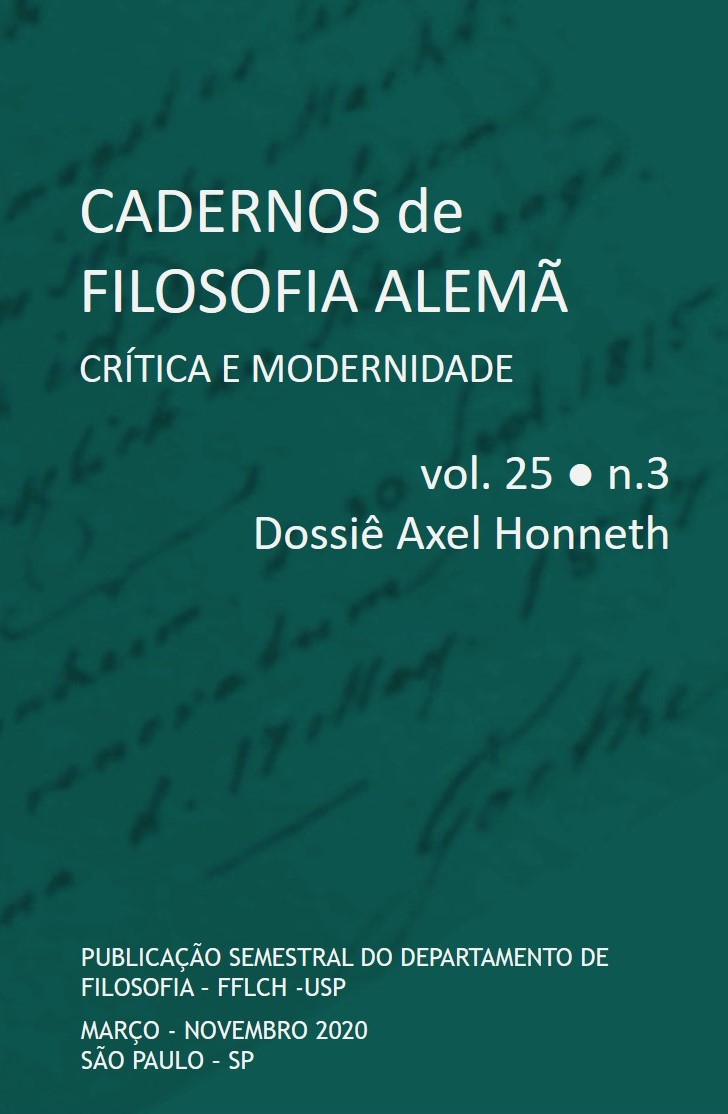Para além da legalidade: Direito e antilegalismo na teoria crítica recente
DOI:
https://doi.org/10.11606/issn.2318-9800.v25i3p113-136Palavras-chave:
Anti-legalismo, democracia, reconhecimento, Axel Honneth, Jurgen HabermasResumo
Uma forte tendência “antilegalista” é identificada por William Scheuerman na teoria crítica recente, a qual colocaria em risco o Estado democrático de direito como principal base normativa e campo prático das lutas emancipatórias. Essa tendência, que encontra em Axel Honneth um de seus maiores expoentes, representaria uma ruptura do modelo desenvolvido por Habermas em Facticidade e validade, em benefício da retomada de uma “orientação contrária ao direito” que alimenta a crítica social desde os tempos de Marx. Partindo das objeções de Scheuerman, o artigo pretende explorar os significados do antilegalismo na obra de Honneth, suas linhas de continuidade com a herança teórica que o antecede e sua possível justificação em nome da persistência e vitalidade da crítica social.
Downloads
Referências
Anderson, J. (2013). The fragile accomplishment of social freedom. Krisis. Journal for Contemporary Philosophy, 1, 18-22.
Bray, M. (2013). Translating Anarchy: The Anarchism of Occupy Wall Street. Winchester: Zero Books.
Brink, B. (2013), From personal relations to the rest of society. Krisis. Journal for Contemporary Philosophy, 1, 23-27.
Brito, G. B. (2020). Desobediência civil entre pós-nacionalização e digitalização. Dissonância: Revista de Teoria Crítica, AOP (Advance Online Publication).
Deflem, M. (2013). “The Legal Theory of Jürgen Habermas”. In: Banakar, R.; Travers, M. Law and Social Theory. Oxford: Hartman Publishing.
Fraser, N. (2010). Scales of Justice: Reimagining Political Space in a Globalizing World. New York: Columbia University Press.
Garcia, R. (2020). Crítica Reconstrutiva em Axel Honneth. Dissertação (Mestrado em Filosofia) – Universidade Federal do Rio Grande do Sul. Porto Alegre.
Gerbaldo, P. (2017). The Mask and the Flag. Populism, Citizenism and Global Protest. Oxford: Oxford University Press.
Graeber, D. (2002). The New Anarchists. New Left Review, 13, 61-73.
Habermas, J. (1992). Faktizität un Geltung. Beiträge zur Diskurstheorie des Rechts und des demokratischen Rechtsstaats. Frankfurt a. M.: Suhrkamp. [Idem, (2020). Facticidade e validade. Trad. Felipe Silva e Rúrion Melo. São Paulo: Ed. Unesp]
Habermas, J. (2015). A Nova obscuridade. Pequenos escritos Políticos V. São Paulo: Ed. Unesp.
Honneth, A. (2001). “Redistribution as Recognition: a response to Nancy Fraser”. In: Fraser, N. Honneth, A. Redistribution or Recognition. A Political-Philosophical Exchange. London: Verso.
Honneth, A. (2002). Grounding Recognition: A Rejoinder to Critical Questions. Inquiry, 45, 499-520. DOI: https://doi.org/10.1080/002017402320947577
Honneth, A. (2003). Luta por reconhecimento: A Gramática Moral do Conflitos Sociais. São Paulo: Editora 34.
Honneth, A. (2007a). “Democracy as Reflexive Cooperation: John Dewey and the Theory of Democracy Today.” In: Disrespect: The Normative Foundations of Critical Theory. Cambridge: Polity Press.
Honneth, A. (2007b). “The social dynamics of disrespect: on the location of critical theory today”. In: Disrespect: The Normative Foundations of Critical Theory. Cambridge: Polity Press.
Honneth, A. (2011). Das Recht der Freiheit: Grundriss einer demokratischen Sittlichkeit. Frankfurt/A: Suhrkamp.
Honneth, A. (2017). Beyond the Law: A Response to William Scheuerman. Constellations, 24(1), 126-132. DOI: https://doi.org/10.1111/1467-8675.12272
Jansen, Y. (2013) The ‘Us’ of democratic will-formation and globalization. Krisis. Journal of Contemporary Philosophy, 1, 32-36.
Jütten, T. (2015) Is the Market a Sphere of Social Freedom?. Critical Horizons, 16(2), 187–203. DOI: https://doi.org/10.1179/1440991715Z.00000000047
Lima e Silva, G.; Silva, F. (2017). “Between experience and structure: Social suffering, collective identities and justice in Iris Marion Young”. In: Bueno, A.; Teixeira, M. (orgs.). On the politics of social suffering. Digithum, 23, Barcelona.
Melo, R. S. (2014). Da teoria à práxis? Axel Honneth e as lutas por reconhecimento na teoria política contemporânea. Revista Brasileira de Ciência Política, 15, 17-36. DOI: https://doi.org/10.1590/0103-335220141502
Rosenfeld, M.; Arato, A. (1998). Habermas on Law and Democracy: Critical Exchanges. Berkeley: University of California Press.
Schaub, J. (2018). Aesthetic freedom and democratic ethical life: A Hegelian account of the relationship between aesthetics and democratic politics. European Journal of Philosophy, 27(1). DOI: https://doi.org/10.1111/ejop.12403
Scheuerman, W. (2017). Recent Frankfurt Critical Theory: Down on Law? Constellations, 24(1), 113-125. DOI https://doi.org/10.1111/1467-8675.12218 [A teoria crítica frankfurtiana recente: Avessa ao direito?. Tradução Bianca Tavolari. Dissonância: Revista de Teoria Crítica, 2018].
Scheuerman, W. (2018). Civil Disobedience. Malden: Polity Press.
Tavolari, B. M. D. (2019). Origens da juridificação: direito e teoria crítica. Tese (Doutorado em direito) – Universidade de São Paulo, São Paulo.
Teixeira, M. (2019). “Can Honneth’s Theory Account for a Critique of Instrumental Reason? Capitalism and the Pathologies of Negative Freedom”. In: Schmitz, V. (ed.). Axel Honneth and the Critical Theory of Recognition. London: Palgrave Macmillan.
Young, I. (2000). Inclusion and Democracy. Oxford: Oxford University Press.
Downloads
Publicado
Edição
Seção
Licença
Copyright (c) 2020 Felipe Gonçalves Silva

Este trabalho está licenciado sob uma licença Creative Commons Attribution-NonCommercial-ShareAlike 4.0 International License.
As informações e conceitos emitidos em textos são de absoluta responsabilidade de seus autores.
Todos os artigos anteriores a 5 de julho de 2018 e posteriores a julho de 2021 estão licenciados sob uma licença CC BY-NC-ND, exceto os publicados entre as datas mencionadas, que estão sob a licença CC BY-NC-SA. A permissão para tradução por terceiros do material publicado sob a licença CC BY-NC-ND poderá ser obtida com o consentimento do autor ou autora.
Políticas de acesso aberto - Diadorim



